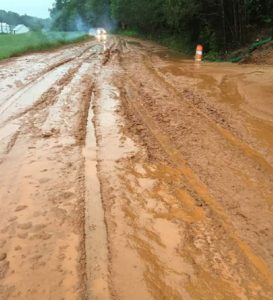New proof: entire Mountain Valley Pipeline project based on known falsehoods
(Note: this blog is based substantially on a filing by the Indian Creek Watershed Association/ICWA to the Federal Energy Regulatory Commission/FERC on December 21, 2018 – Accession No. 20181221-5334. As this blog was being posted, several more stories broke regarding likely violations of the Clean Water Act by Mountain Valley Pipeline. In a front-page story on January 23, 2019, the Roanoke Times reported a well-documented request by Roanoke attorneys to the federal Environmental Protection Agency for a criminal investigation of MVP On February 15, 2019 the Roanoke Times confirmed that the there is a federal criminal investigation of MVP underway. And Roberta Kellam, former member of Virginia’s State Water Control Board – charged with enforcing the federal Clean Water Act in the Commonwealth – revealed potential violations by Department of Environmental Quality staff and very questionable behavior by DEQ Director David Paylor. Kellam wrote articles for the Virginia Mercury in December 2018 and January 2019. )
Before approving the Mountain Valley Pipeline (MVP), the Federal Energy Regulatory Commission (FERC) had to show that it would do no substantial environmental harm, supposedly demonstrated in the Final Environmental Impact Statement (FEIS) they issued on June 23, 2017 (Accession No. 20170623-4000). In granting the FEIS, the FERC relied on MVP’s stream scour and erosion analyses and plan containing specific information about pipeline construction at stream crossings along the entire pipeline route.
Yet within months of starting the project, MVP submitted a variance request asking permission to change its plan. In doing so, MVP admitted to the FERC that:

“The [MVP plan] was a theoretical desktop analysis and did not take site specific constructability issues (elevations, terrain, and workspace) into account. During its subsequent field reviews, [MVP] determined that execution of the mitigation measures, as written, would pose increased environmental or landslide risks or be unsafe or impractical due to terrain or geology.”
In response, FERC’s own expert consultant stated that MVP should be required to “provide a site-specific scenario… for each location [where MVP proposed to change its original plan].”
So it is clear that the FERC-approved FEIS does not protect the environment. Despite MVP’s confession, Paul Friedman (FERC Project Manager) or someone at a higher level overruled the FERC’s own expert consultant by
- Rejecting the expert’s directive that MVP do a site-specific analysis of every water body crossing on the route where MVP proposed to change its original plan.
- Allowing MVP to produce revised plans with lower environmental standards (June 2018).
- Failing to provide state environmental agencies or the public an opportunity to comment on revised plans.
- Approving, without opportunity for public comment, a project-wide variance (MVP-006) on September 26, 2018 that allows MVP to violate Best Management Practices without oversight.
- Producing this hasty variance approval at EXACTLY the same time that MVP announced a lengthy delay and major cost increase. MVP and its investors – not clean water, landowner rights and protection of public lands – seemed to be the core FERC audience for this action.
- Hiding the relevant correspondence from the public, the courts and both federal and state regulators.
- Trying to hide the name of the FERC Project Manager in documents that ICWA acquired through a Freedom of Information Act Request (FOIA).
BY KEEPING CORRESPONDENCE SECRET, FERC DENIED INFORMATION THAT WOULD HAVE INFORMED DECISIONS BY FERC COMMISSIONERS, THE FEDERAL 4TH CIRCUIT COURT OF APPEALS AND THE VIRGINIA STATE WATER CONTROL BOARD, among others. Surely it would have mattered if decision makers had Read more »
